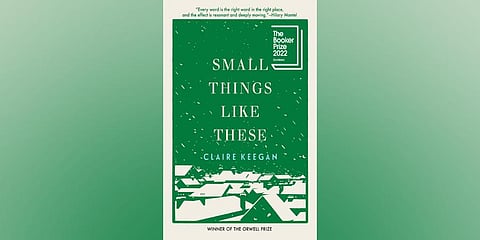

From the very first paragraph, Small Things Like These hooks you with its measured prose and poetic lilts. Claire Keegan skilfully wields crisp as well as long sentences, conversational cadences, and Irish terms like stotious and lean by to sculpt an engrossing world of words. Each phrase is polished to perfection. But these are not mere embellishments. As the story unfolds, it becomes evident how her language reflects the characters’ mental states, conversations and landscapes.
The protagonist is Bill Furlong, a coal and timber merchant in the Irish town of New Ross. Born to a teenage single mother working at a widow’s house, he lives with his wife and five daughters. As the Christmas season approaches, we follow him at work, delivering fuel to homes and institutions. One day, he goes to a Magdalene laundry, a Catholic nun-run institution that ostensibly trained and educated girls. These laundries were common across Ireland in the 18th century.
Keegan writes about them in the post-script: “Many girls and women were concealed, incarcerated, and forced to labour in these institutions. Ten thousand is the modest figure; thirty thousand is probably more accurate… Rarely was any of these girls’ or women’s work recognised or acknowledged in any way. Many lost their babies. Some lost their lives. Some or most lost the lives they could have had.”
An encounter with Sarah, a girl locked up in the laundry’s coal house, puts Bill in a quandary. A battle between individual conscience and societal norms ensues, inserting a rift between the right thing to do and the convenient course of action. Bill continuously weighs the costs and benefits of rebellion and conformity, without any concrete answers for the most part.
While he always veered towards the good—giving to charity despite his wife’s jibes and constrained finances or defending his daughters when the Mother Superior lamented that he has “no boy to carry on the name”—these were still within the bounds of ‘respectability’. It’s easy to do good when there’s nothing at stake, but would we still abide by what we pay lip service to when the repercussions are life-changing?
Keegan explores this in her tautly structured book. There is barely a superfluous word. Each sentence packs a wealth of information about the characters’ lives and milieu. The domesticity the description of Bill’s family baking together evokes is in stark contrast to a nun rustling up duck eggs, black pudding, and margarine toast for Sarah. Bill’s existential angst could have just been another plot device or pointless psychological paraphernalia, but it eventually feeds into his personality and decisions.
Despite the conflict at its heart, Small Things Like These eschews high drama or riveting peaks and troughs for a gentle progression. Along the way come small, tender revelations. The narrative unfolds so gradually that when the end comes, it is a surprise.
The story begins in October 1985 and culminates around late December. Like a classic Christmas story, it warms your cockles. Amid the novella’s grim, grey winter and pervasive coal soot that coats the characters’ lives and conscience, that is a hearty achievement.
(This is the fourth of a six-part series, featuring reviews of books shortlisted for this year’s Booker Prize)
‘In the tautly structured book, each sentence packs a wealth of information about the characters’ lives and milieu.’
Small Things Like These
By: Claire Keegan
Publisher: Faber & Faber
Pages: 128
Price: Rs 599